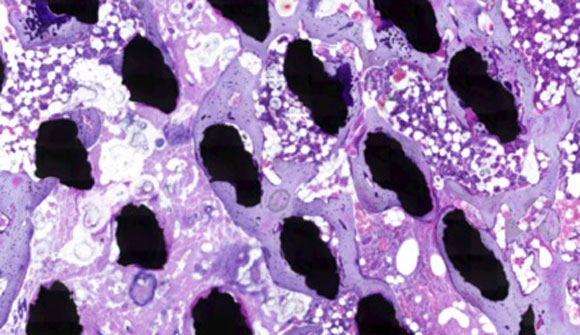Johnson & Johnson acquires metal AM implant manufacturer Emerging Implant Technologies
September 14, 2018

EIT’s spinal implants have an open and interconnected porous structure designed to encourage osseointegration (Courtesy Emerging Implant Technologies GmbH)
Johnson & Johnson Medical Devices Companies, through its subsidiary Johnson & Johnson Medical GmbH, Norderstedt, Germany, has acquired Emerging Implant Technologies GmbH (EIT), Wurmlingen, Germany, a privately held company which produces titanium interbody implants for spinal fusion surgery by metal Additive Manufacturing.
The range of products which Johnson & Johnson acquires in the transaction use EIT’s proprietary advanced cellular titanium, which consists of an open and interconnected porous structure designed to encourage osseointegration or ‘bone ingrowth’ into the implant. Johnson & Johnson Medical Devices Companies stated that it will leverage its global commercial infrastructure to bring EIT’s technologies to patients internationally.
The acquisition is also expected to allow DePuy Synthes, the orthopaedics business of Johnson & Johnson, to enhance its interbody implant portfolio, which already includes expandable interbody devices and titanium-integrated PEEK technology, for both minimally invasive and open spinal surgery. The EIT technology will complements DePuy Synthes’ investment in the interbody implant segment in spine.
“Our goal is to offer a complete portfolio of interbody solutions that provides surgeons with even more options for the treatment of their patients,” stated Aldo Denti, Company Group Chairman of DePuy Synthes. “We are excited to welcome the skilled team at EIT, and together we aspire to bring to market technologies that allow surgeons to perform spinal fusion procedures reliably and with consistent outcomes.”
DePuy Synthes stated that this acquisition underscores its commitment to building an innovative portfolio of spine solutions to improve the standard of care for patients. Moving forward, it will continue to focus on the spinal diseases with the most potential for surgeons and their patients – degenerative disc disease, deformity and complex cervical – and introduce technologies in the fastest-growing segments within these disease states; specifically, interbody implants, enabling technologies, minimally invasive spine, and biomaterials.
















